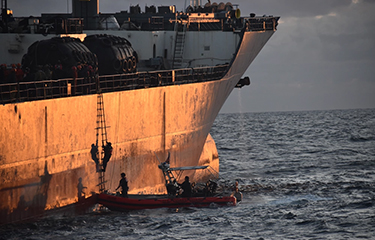US Coast Guard opens IUU Fisheries Center covering Indo-Pacific, ups patrols off Peru

CORRECTION: A previous version of this story incorrectly stated that the SPRFMO operates via consensus-based governance. SPRFMO uses majority vote in its fisheries decision-making. SPRFMO Executive Secretary Craig Loveridge told SeafoodSource: "Whilst SPRFMO strives to take decisions by consensus wherever possible, voting has been used regularly and continues to be an important feature of SPRFMOs decision-making processes."
The U.S. Coast Guard is taking more aggressive action to police the Pacific Ocean in an effort to curb illegal fishing conducted by China’s distant-water fleet.
The USCG has opened the Illegal Unreported Unregulated Fisheries Center of Expertise (IUUF COE) in Honolulu, Hawaii, U.S.A., to serve as the center for U.S. efforts to combat illegal fishing activity in the Indo-Pacific region, including advising partner nations in preventing and countering illegal, unreported, and unregulated (IUU) fishing in their home waters. And it recently completed an operation to counter IUU fishing off the coast of Peru.
Additionally, the USCG has plans to increase its deployments in the Western Pacific, in coordination with the U.S. Indo-Pacific Command and U.S. Navy’s 7th Fleet, with the goal of supporting U.S. bilateral maritime law enforcement agreements with Pacific Island countries.
“The U.S. Coast Guard considers illegal fishing to be the world's top maritime security threat, now that regional piracy concerns have abated,” it said in a press release. “IUU fishing is harder to target, as it can occur almost anywhere – including areas beyond national jurisdiction, where enforcement is challenging.”
U.S. Deputy Commandant for Operations Policy Rear Admiral Michael Ryan told Defense One in February 2023 the larger presence of U.S. military personnel in the region is so the U.S. can “better compete with Chinese influence” in the waters surrounding Micronisa and other Pacific Island countries. Ryan said the Coast Guard's efforts were intended to elevate maritime governance in remote reaches of the Pacific.
As part of that effort, the USCG launched Operation Southern Shield in October 2023. The Coast Guard cutters Alder, Terrell Horne, and HC-130 Hercules aircraft completed high-seas boardings and inspection in the Eastern Pacific Ocean near Peru under a newly adopted conservation and management measure to monitor and inspect fishing and transshipment operations at-sea in the South Pacific Regional Fisheries Management Organization (SPRFMO) Convention Area.
SPRFMO members include 17 countries, including China, and it manages jack mackerel and jumbo flying squid fisheries in the Eastern Pacific. As an SPRFMO member, the U.S. has the right to board and inspect other signatories' fishing vessels in the SPRFMO's coverage area, which stretches from Australia to Chile.
“The U.S. Coast Guard is committed to working with our allies and partners to strengthen the international fisheries enforcement regime and stop the pervasive IUU fishing threat,” USCG 11th District Commander Rear Admiral Andrew Sugimoto said. “Operation Southern Shield is just the latest example of that commitment, and we will continue to model and support rules-based order. We applaud the SPRFMO Commission for adopting these latest inspection guidelines and hope to see additional management measures adopted in the future to ensure the sustainability of our ocean resources. Last year, we operated off the Galapagos, this year off the coast of Peru, and we will continue to deploy aircraft, cutters, and personnel to support our partners and monitor these distant-water fleets wherever they roam. These operations help bring like-minded countries closer together to protect vulnerable fish stocks, support the economic stability of coastal nations, the livelihoods of small-scale and artisanal fishermen, and safeguard ocean resources that fuel global populations and economies.”
Hundreds of Chinese distant-water squid-fishing vessels operate off the coast of Peru, and some have resisted U.S. inspections. Out of hundreds of Chinese vessels in the area, only five have complied with a new Peruvian law requiring them to install electronic monitoring systems or face prohibition from calling at Peruvian ports, according to the Southern Pacific Jumbo Flying Squid (CALAMASUR). However, the result has been that Chinese vessels now rarely come into Peru’s ports, meaning Peruvian authorities have fewer opportunities to board and inspect Chinese vessels.
Photo courtesy of U.S. Coast Guard






Share